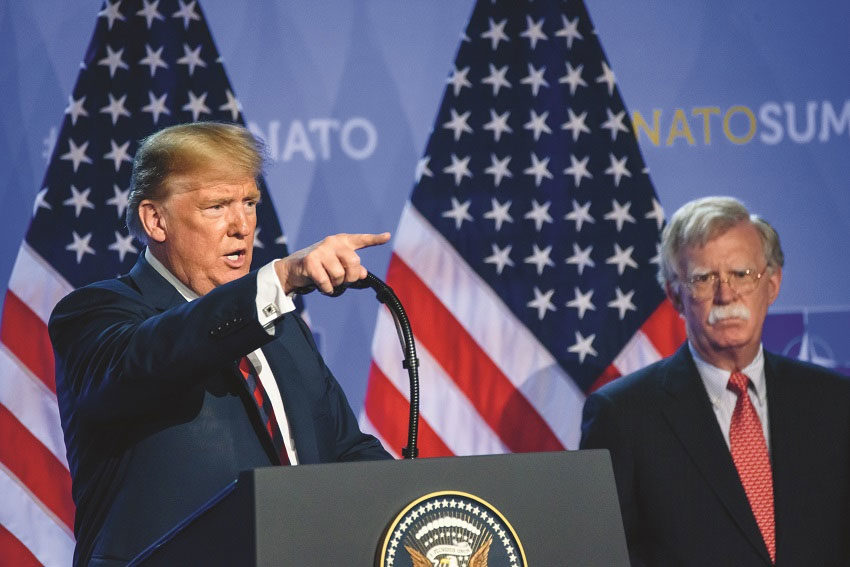Modern Times: Avoid the narrow road to war

As the Trump administration’s foreign policy grows ever hawkish, could our historic alliance with the United States see us follow Trump into new conflicts?
‘Of imperial dreams and dead men, all that remained was long grass.’
– Richard Flanagan’s Narrow Road to the Deep North
We remember war in shades of darkness. Many of the servicemen and women of recent wars returned, so we show care for the mental health issues faced by returning soldiers. We show thanks to the families who lost their closest. We show gratitude as we remember the sacrifices made. Temporal distant brings a modicum of lightness. The darkness softens as the memory of war recedes into the past.
The depth of darkness our soldiers experienced during the Pacific War was beautifully rendered in Flanagan’s Narrow Road to the Deep North. Is it possible for such beautiful writing to do testament to war’s brutal, primitive, dehumanising reality? War is fought in prose but remembered in poetry. Flanagan may be too brilliant a writer to not soften the sickening descent into unimaginable, perpetual, banal wickedness. Though he tried.
Many things described in this book were harrowing, but not so much that one could truly imagine, let alone feel, the evil that took place. The story’s hero Dorrigo Evans “grasps the truth of a terrifying world in which one could not escape horror, in which violence was eternal, the great and only verity, greater than the civilisations it created, greater than the God any man worshipped…” But violence need not be eternal. The horrors of wars are not inescapable.
The story of Australia at war is not only a tale of diggers and nurses, of violence and sacrifice. It is also story of diplomats and prime ministers, of ‘great and powerful friends’ and ‘deputy sheriffs’. We agree that age shall not weary our fallen soldiers, but has it affected our determination to never repeat the mistakes of the past? It is important that we remember not only the horrors of war, but the decisions that make such violence both inevitable and prolonged. Iraq was a choice. Afghanistan was a choice, as was Iraq again. As were Korea and Vietnam.

There appears to be some significant strategic and moral challenges in respect to the government’s foreign policy. The biggest challenge facing the recently re-elected Coalition may not come from China. It may be tested by a declining (relative to its recently resigned hegemonic status) ally. Indeed, it may have been tested already. It was reported in February that John Bolton, National Security Advisor to the United States, was about to visit Australia. Most Australian media outlets suggested his arrival was imminent; there were no reports of him actually being here. If Bolton was in Australia, his visit was kept very secret.
Bolton is a hawk who served conservative presidents Reagan, GHW Bush and GW Bush. Though he takes a hard line with respect to North Korea, he is more focussed on Iran. Writing as a citizen, Bolton penned an opinion piece for the New York Times in 2015 that carried the headline: To Stop Iran’s Bomb, Bomb Iran. A desert separates the perceived threat emanating from Iran and reality: its military budget is one-fortieth of that of the United States.
The sanctions imposed by Trump are incredibly strong, and pressure has been applied to America’s friends and allies elsewhere. At the Warsaw Summit in February, Vice President Mike Pence expressed his desire for Israel, Bahrain, Saudi Arabia and the United Arab Emirates to “break bread together”, as they contemplated common challenges. He also asserted it was “time for our European partners to withdraw from the Iran nuclear deal”.
This same deal had been respected by Iran, as certified by the International Atomic Energy Agency, as well as by the United States Government. The merits of this deal had been accepted by the former Secretary of State Rex Tillerson and former National Security Advisor General HR McMaster. Both had opposed American withdrawal. Both were duly replaced. The threat may be negligible, but the agenda is clear.
It has been reported that President Trump is planning a visit to Australia as early as July. What will be his demands of Australia? Trump and Bolton have different instincts and different agendas. There is no obvious outcome of war with Iran that would interest to Trump. Is it a feint? Will the Trump Administration loosen the noose of obligation around Australia’s neck in the Middle East, in exchange for a stronger role for Australia in the South China Sea?
Iran is under greater economic pressure than at any other moment since the Revolution of 1979. Devoid of other options, it may strike first. If America sets its heart upon another coalition of the willing and Australia comes calling, it will be another test of our independence – and of the strength of our memory of war. Another needless war would be further evidence that the fictional Dorrigo Evans was right. Violence is the only truth “greater than the civilisations it created, greater than the God any man worshipped”.